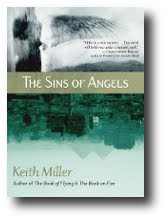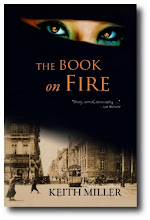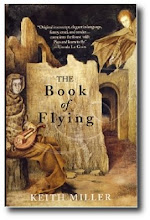November 10, 2014
Olondria Wins the World Fantasy Award!
My wife's novel A Stranger in Olondria has won the World Fantasy Award for best novel. Earlier this year, Sofia won the British Fantasy Award for best novel, as well as the John W. Campbell Award and the Crawford Award. At the World Fantasy Convention, she announced that she has signed a contract with Small Beer for a second novel, The Winged Histories, and a collection of stories.
October 10, 2014
September 26, 2014
Books That Influenced Tolstoy
Open Culture has a list written by Tolstoy of books that influenced him. Very pleased to see my beloved George Eliot on the list. Mrs. Henry Wood (Ellen Wood) is new to me. I'll have to check her out. They also have a scratchy audio recording of him reading in English, German, French, and Russian.
Here's the book list:
WORKS WHICH MADE AN IMPRESSION
Childhood to the age of 14 or so
The story of Joseph from the Bible - Enormous
Tales from The Thousand and One Nights: the 40 Thieves, Prince Qam-al-Zaman - Great
The Little Black Hen by Pogorelsky - V. great
Russian byliny: Dobrynya Nikitich, Ilya Muromets, Alyosha Popovich. Folk Tales - Enormous
Puskin’s poems: Napoleon - Great
Age 14 to 20
Matthew’s Gospel: Sermon on the Mount – Enormous
Sterne’s Sentimental Journey – V. great
Rousseau Confessions - Enormous
Emile - Enormous
Nouvelle Héloise - V. great
Pushkin’s Yevgeny Onegin - V. great
Schiller’s Die Räuber - V. great
Gogol’s Overcoat, The Two Ivans, Nevsky Prospect - Great
“Viy” [a story by Gogol] – Enormous
Dead Souls - V. great
Turgenev’s A Sportsman’s Sketches - V. great
Druzhinin’s Polinka Sachs - V. great
Grigorovich’s The Hapless Anton - V. great
Dickens’ David Copperfield - Enormous
Lermontov’s A Hero for our Time, Taman - V. great
Prescott’s Conquest of Mexico - Great
Age 20 to 35
Goethe. Hermann and Dorothea - V. great
Victor Hugo. Notre Dame de Paris - V. great
Tyutchev’s poems – Great
Koltsov’s poems – Great
The Odyssey and The Iliad (read in Russian) – Great
Fet’s poems – Great
Plato’s Phaedo and Symposium (in Cousin’s translation) – Great
Age 35 to 50
The Odyssey and The Iliad (in Greek) – V. great
The byliny - V. great
Victor Hugo. Les Misérables - Enormous
Xenophon’s Anabasis - V. great
Mrs. [Henry] Wood. Novels – Great
George Eliot. Novels – Great
Trollope, Novels – Great
Age 50 to 63
All the Gospels in Greek – Enormous
Book of Genesis (in Hebrew) – V. great
Henry George. Progress and Poverty - V. great
[Theodore] Parker. Discourse on religious subject – Great
[Frederick William] Robertson’s sermons – Great
Feuerbach (I forget the title; work on Christianity) [“The Essence of Christianity”] – Great
Pascal’s Pensées - Enormous
Epictetus – Enormous
Confucius and Mencius – V. great
On the Buddha. Well-known Frenchman (I forget) [“Lalita Vistara”] – Enormous
Lao-Tzu. Julien [S. Julien, French translator] – Enormous
September 7, 2014
Salah Elmur
Salah Elmur was one of the artists I hung out with in Khartoum in the early 1990s. He had a unique playful style, reminiscent of Paul Klee. His wife was also an artist, working on fanciful dolls. I later met him in Nairobi, where he was living with a number of other Sudanese artists who had fled Bashir's repressive regime. I recently stumbled on Salah's new website, and also realized he has a Facebook page filled with wonderful images. His latest work is remarkable, combining East and Northeast African idioms and symbols with an artistic sensibility the equal of David Hockney or Francis Bacon.
July 3, 2014
Tiny Brontë Books
The LA Times writes about Charlotte and Bramwell Brontë's tiny books, made when they were twelve and thirteen, respectively. The Houghton Library at Harvard holds nine of the books, which are just an inch wide and two inches long; eleven others are held by the Brontë Museum or are in private collections. You can leaf through the books here.
June 20, 2014
"The Blue Girl"
My short-short story "The Blue Girl" won our local paper's flash fiction contest. You can read the story here (it'll take you thirty seconds). The cover of the paper was an illustration of the story!
May 23, 2014
The Book on Fire Review
Nice review of The Book on Fire from The Broke and the Bookish:
"This is a book about book lovers. This is a book for book lovers. This is a book for someone who can curl up in the same spot for hours and completely lose their surroundings to the story they are occupying. This book so accurately captures the feeling of being entranced and obsessed with stories. It describes how stories are completely different when they are read alone than when they are read aloud and shared with another. It wonders what happens to a story when its book has been burned . . ."
April 22, 2014
"The Missing Borges"
Marvelously convoluted and Borgesian tale of a stolen Borges first edition, the Argentinian National Library, and a possibly shady bookseller, up at the Paris Review:
"Casares, now suspected of having taken part in the very crime whose investigation he had initiated, testified before the judge that the book was not the same one that had been stolen from the Library—nor, however, was it the facsimile he’d sold to Pastore. It was, he explained, a third book, similar to the others."
April 15, 2014
The Death of Araweilo
Excellent poem by my wife up at Tor:
"Araweilo the queen is dead wicked queen Araweilo.
Sing she is dead.
Rejoice she is dead cruel Araweilo the foe of men.
She is dead, the queen of impossible tasks who said: Men climb Mil-Milac or else you die, climb Mil-Milac the mountain of glass.
Araweilo laughed and her teeth were of glass like the mountain her manicured nails were of glass and the clasps of her slippers her cell phone her lipstick her car."
Read a bit about Araweilo here.
April 7, 2014
The English Patient
I first read The English Patient in Atbara in northern Sudan, and the wonderful Lee Miller photo on the cover echoed the landscape. For a couple of years I couldn't get enough of the book, rereading it every few months. The sentences are so carefully wrought, the language always riskily fresh:
"We die containing a richness of lovers and tribes, tastes we have swallowed, bodies we have plunged into and swum up as if rivers of wisdom, characters we have climbed into as if trees, fears we have hidden in as if caves. I wish for all this to be marked on my body when I am dead. I believe in such cartography - to be marked by nature, not just to label ourselves on a map like the names of rich men and women on buildings. We are communal histories, communal books. We are not owned or monogamous in our taste or experience. All I desired was to walk upon such an earth that had no maps. I carried Katharine Clifton into the desert, where there is the communal book of moonlight. We were among the rumor of wells. In the palace of winds."
Though the characterization is at times awkward - a by-product of Ondaatje's risk-taking - one falls achingly in love with the characters.
Ondaatje writes piecemeal, crafting scenes, honing characters, and then hoping for a narrative. He has said that the first section he wrote was Caravaggio's theft of the camera in the hotel. The English patient's voice arrived with the word "aerodrome."
Count Ladislaus de Almásy, Ralph Bagnold, Hassanein Bey, and certain others mentioned in the book were genuine desert explorers. The real Almásy was, however, gay.
Though the setting is exotic, some of the Katharine/Geoffrey Clifton/Ladislaus de Almásy triangle may be related to Ondaatje's theft of Kim Ondaatje (thin, blonde, artsy) from her professor husband in Ontario.
(An extended aside: Ondaatje's books echo each other, so rereading them is a curiously deep and wide experience. Anna in Divisadero says: "We live permanently in the recurrence of our own stories." Here are some echoes.
Names in The English Patient: Hana, Clara, Kip. Names in Divisadero: Anna, Claire, Coop. Anna and Hana also chimes with Anil from Anil's Ghost.
Kip is a Sikh, a group that has a "mystical affinity for machines." Coop prefers metal to wood: "all those varieties and modes of metal life." Kip is a sapper, dismantling bombs. Coop "loved risk and could be passive around danger."
When Coop loses his memory after being tortured, Claire pretends to be Anna. Anil buys her brother's name for "one hundred saved rupees, a pen set he had been eyeing for some time, a tin of fifty Gold Leaf cigarettes she had found, and a sexual favor." In Divisadero, Roman and Marie-Neige pretend to be brother and sister. "A family keeps its secrets," notes Anna.
Coop is tortured in Divisadero. Caravaggio is tortured in The English Patient.
Both Caravaggio and Rafael's thief father find their wives during or in the aftermath of robberies.
In The English Patient, Kip subsists on raw vegetables and herbs. In Divisadero, Rafael always seems to have raw herbs about him.
In Divisadero, Anna brings soap with her "from another world." In Running in the Family, a boar steals Ondaatje's Pear's transparent soap, which he has carried through the filthy hotels of Africa.
Kip and Coop both refuse drugs.
Caravaggio and Rafael are both named for Italian painters.
In Coming Through Slaughter, Buddy Bolden smacks and shatters a window pane. In Divisadero, Anna shoves a triangle of glass into her father's shoulder. Later in Divisadero, Lucien receives a splinter of glass in his eye.)
The themes of The English Patient include identity, religions, encounters across cultures, and youth/age. At one point the English patient says:
"There's a painting by Caravaggio, done late in his life. David with the Head of Goliath. In it, the young warrior holds at the end of his outstretched arm the head of Goliath, ravaged and old. But that is not the true sadness in the picture. It is assumed that the face of David is a portrait of the youthful Caravaggio and the head of Goliath is a portrait of him as an older man, how he looked when he did the painting. Youth judging age at the end of its outstretched hand. The judging of ones's own mortality. I think when I see him at the foot of my bed that Kip is my David."
But the thief Caravaggio is of course also a portrait of Ondaatje, and one could surmise that the older Ondaatje is judging the young self who committed the infidelities with an older woman.
The English Patient gathers many other works into its pages: Anna Karenina, Kim (echoing his first wife's name, and also chiming with Kip), Herodotus's Histories, A Midsummer Night's Dream ("Sometime a fire" is from a speech by Puck), Paradise Lost, and jazz lyrics, among others.
The book does not entirely work. The final sections, in which Kip, an Indian Sikh, hears of the atomic bombs on Hiroshima and Nagasaki and imagines "all Asia on fire," then threatens the English patient and drives off in a rage, are silly. As is "meet me at the moondial." Overall, Kip is the least convincing character. His actions lack coherence. However, the scenes in which he watches the Virgin come across the water, and his hours in deserted Naples are lovely.
Ondaatje's earlier books are wonderful. In the Skin of the Lion and Running in the Family have the same romantic, piecemeal, slightly insane quality I love in The English Patient. Unfortunately, as so often seems to be the case, the success of The English Patient appears to have had a negative effect on Ondaatje's writing. Anil's Ghost feels forced and thin, Divisadero doesn't work structurally, and The Cat's Table is too light.
March 1, 2014
Olondria and "Selkie Stories" Up for Nebulas
My wife's novel A Stranger in Olondria and short story "Selkie Stories Are for Losers" are up for Nebulas. Fingers crossed!
January 26, 2014
Olondria Wins the Crawford!
My wife's novel, A Stranger in Olondria, has won the Crawford Award for best first fantasy novel! She's in great company: past winners include Charles de Lint, Jonathan Lethem, K. J. Bishop, Christopher Barzak, and Jasper Fforde.
Subscribe to:
Posts (Atom)






















